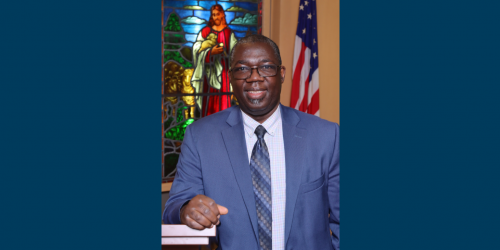
Alfred Kambaki is the regional director of Spiritual Care and the Chaplain Educator serving Adventist Medical Center Hinsdale, Bolingbrook, La Grange and GlenOaks in the greater Chicago area. In his role, he manages the welfare of his department, ensuring his team has the support and tools they need to provide spiritual care. Photo credit: Dave Pflederer
Once during his patient rounds, Chaplain Alfred Kambaki entered the room of a patient who was isolated and alone. Kambaki spent 45 minutes talking with him, and at the end, the patient made a small request: “Could you please give me a hug?”
Kambaki happily obliged and as they embraced, the patient clung to him and heaved.
“When I let go, he was crying and said, ‘You are my angel,’” Kambaki recalled.
From that moment, Kambaki became his source of spiritual support until the day the patient died. He had been very lonely, and only later did Kambaki learn that his lack of visitors was due to the smell produced by his medical condition.
Kambaki draws two key points from that story — one, that God is still at work, and two, that God works in spite of Kambaki’s failings. Kambaki managed to be in that room for nearly an hour when all others would go in for only the amount of time absolutely necessary. How? He lost his sense of smell when he was 3 years old.
“It’s not about me. It’s about God doing His work at the right time,” he said. “My weakness — my failing — is what God wanted to use so I could connect with this patient heart to heart.”
Kambaki is the regional director of Spiritual Care and the Chaplain Educator serving Adventist Medical Center Hinsdale, Bolingbrook, La Grange and GlenOaks in the greater Chicago area. In his role, he manages the welfare of his department, ensuring his team has the support and tools they need to provide spiritual care. He summarizes it as ministering to his team as they minister to others.
There was a time when the people in Kambaki’s life didn’t consider chaplaincy ministry. He had been a congregational pastor and a church administrator before going into clinical pastoral care.
“People were convinced that my move into chaplaincy was a departure from ministry,” he said. “Chaplains were considered individuals who had failed in ministry.”
But nothing could be further from the truth. For Kambaki, serving as a chaplain means living out the Word of God.
“I help people understand God loves them when I demonstrate love and communicate what it means to be loved when you are sick,” Kambaki said. “That’s the incarnation of the Word.”
Kambaki has served in clinical pastoral care at various hospitals and health systems since 2003. He said his greatest lesson has been in acknowledging that the world is not static, life is dynamic and, as such, he should be learning from the people with whom he interacts every day.
How does he do that?
“It’s important to listen to people in whatever station of life they are in,” he said, “to see them — beyond what is on the surface — and understand where they’re coming from.”
Ingrid Hernandez, AdventHealth, manager of Stakeholder Communications